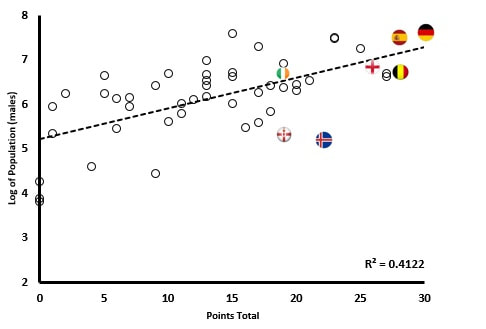Earlier this week the Economist newspaper told the now quite well-known story behind the rise of Iceland. The article is called “How Iceland (population: 330,000) qualified for the World Cup”. In short, it’s a story of investment and good organisation. Pouring resources into infrastructure such as artificial surfaces for schools and upskilling coaches, coupled with some savvy tactics, has steered Iceland to another major international competition.
The population figure stood out the most for me. With that in mind, I plotted the relationship between male population levels (log) for UEFA entrants and the amount of points earned over the 2018 UEFA World Cup Qualification phase.
The graph considers 53 entrants from the UEFA confederation. The population data was accessed from Eurostat and official labour market statistics for the individual UK countries. The population figures represents the male population level for 2016.
As for ourselves, Ireland totalled 19 points from a population of 2,335,733 males. Northern Ireland, also reached 19 points with just a population of 232,804 – that’s not far behind Iceland.
You’d have to be worried for the minnows that failed to earn a point. San Marino, Liechtenstein and Gibraltar will probably always struggle, saving a significant population growth; they select a squad from a pool of under 20,000 men.
For Iceland, Eurostat reports a male population figure of 167,270. For a 23-man World Cup squad, approximately one in every 7,000 Icelander has a chance of making it! Population is clearly important but the Iceland story reminds us that this is not an iron relationship.

 RSS Feed
RSS Feed